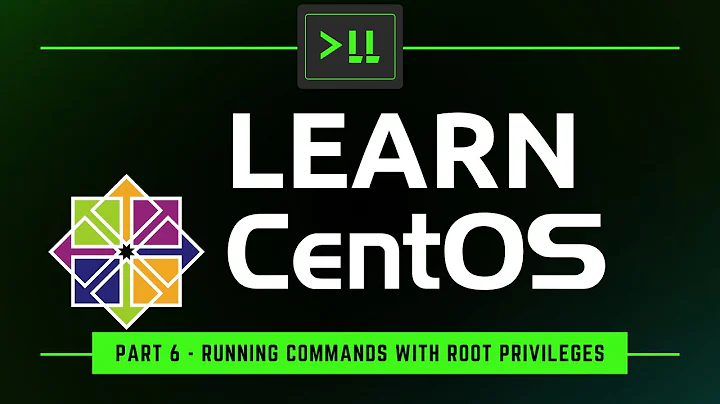Incrond running but not executing commands CentOS 6.4
Solution 1
Ok, here's the answer:
Despite all documentation I can find declaring it to be the contrary, incrond under CentOS 6.4 runs in a sparse environment and behaves as cron. this is NOT the case under Ubuntu, where incron inherits its environment from root for system tables and root tables and only user tables run in a sparse environment. This of course means that if you're calling a script (I am) the script needs to build it's environment and every thing must have a full path. EVERYTHING. (well, except for shell builtins :p)
numerous Google and and Bing and Stack Overflow and Server Fault searches all told me that cron operates this way, but they all also seemed to indicate that incron operates as described in the documentation, which it DOES under Ubuntu...
Bottom line, it works now, yay!
- I guess this just goes to show: when in doubt define the environment and use full paths... er, actually, just do that all time and save yourself a headache.
(this does not address my problem with applying a SELinux security policy for incron, but I'll worry about that later, in another post...)
Solution 2
I had the same issue. After a lot of trial and error I found that my original line of
/path/to/watch IN_CLOSE_WRITE /usr/local/bin/mycommand $@/$#
does not work but the following does work:
/path/to/watch IN_CLOSE_WRITE /bin/sh /usr/local/bin/mycommand $@/$#
I guess incron doesn't honour scripts with a shebang (yet?) and needs an interpreter within the command.
edit: after a little more testing I found that if the command is a (bash or shell) script it will need the .sh extension or it needs to be prepended with an interpreter like /bin/sh. So the following examples will both work (under CentOS 6.4 at least)
/path/to/watch IN_CLOSE_WRITE /bin/sh /usr/local/bin/mycommand $@/$#
/path/to/watch IN_CLOSE_WRITE /usr/local/bin/mycommand.sh $@/$#
Solution 3
Due to insufficient reputation, my contribution comes as a separate answer rather than a comment on user199085's.
Yes, the OP says centOS but for the ubuntu folks, I also hadd to stick sudo -u my_user_name before the bin/sh bit. So, the line becomes
/path/to/watch IN_CLOSE_WRITE sudo -u my_user_name /bin/sh /usr/local/bin/mycommand $@/$#
Related videos on Youtube
JawzX
Updated on September 18, 2022Comments
-
JawzX over 1 year
I have copied this question over here from StackOverflow...
I have installed incron from the EPEL repository (0.5.9) (before you ask; YES, I also tried downloading the source and compiling locally (0.5.10); same results) and am attempting to set up a process on my CentOS 6.4 (final) virtual box that I have successfully prototyped on my local Ubuntu 12.04 machine (process including
incronworks perfectly under Ubuntu):Some information up front:
- SELinux is set PERMISSIVE (I have also tried DISABLED, it seems to make no difference!)
- I have added my script(s) and called executables to all with NOPASSWD using
visudoto get around some permissions issues... -
I have tried to apply the policy for incron as desribed here http://blog.siphos.be/2013/05/a-selinux-policy-for-incron-finishing-up/ but I keep getting
libsepol.policydb_read: policydb magic number 0x696c6f70 does not match expected magic number 0xf97cff8c or 0xf97cff8d semodule_package: Error while reading policy module from incron.tewhen I try to use
semodule_package I have tried to define environment both in the script itself and in a pre-script
caller.shby doing this I am able toenv > /tmp/envfile.txtwhich indicates the script is running in a clone of thesudo env(as I intended) however I still get no output from my script, either the work it is supposed to do on it's input file or any of it's logs...it's gotta be permissions right? (I'm about one more day of this away from just doing
chmod -r 777on the root file system ;) )Under Ubuntu 12.04 the simple act of doing
sudo incrotab -eand entering/tmp/ IN_CREATE,IN_NO_LOOP env > /home/username/envfile.txtshows that incron is already running in the root/sudo environment, as the incron documentation suggests it should be.Is this all SELinux-related stuff, or is there something else going on in CentOS thats making this so difficult?
If I invoke my script from the command line with
sudo /path/to/my/script.sh argumentsit works like a charm.or for that matter if I invoke
caller.shit all works fine, but whencaller.shis invoked byincrondits the same, can't evenenv > /dev/pts/0from it. (though I CANenv > /tmp/envfile.txtsudo service incrond statusverifies that incrond is running. root and myusername are added to/etc/incron.allow,/etc/incron.denyis empty.the below is deprecated, see bullet points above, but read it for backstory and expansion...
My incrotab for root is:
/path/to/dropfolder/ IN_CLOSE_WRITE sudo /path/to/my/script.sh $@/$#Events in
/path/to/dropfolder/result in NOTHING useful happening. logs are generated in /var/log/cron, no messages, no actions occur on the files in the folder.So I have researched: it was suggested that
cronruns in a minimal environment and that to execute complex commands/scripts you may have to execute your.bashrcand/or export your PATH at the beginning of the cron command.Edit: Documentation indicates that
incronrun from system tables or root takes env from its host enviroment, therefore onlyincronexecuted by non-root users should require any sort of env or PATH fiddlingSo… incrontab for root:
/path/to/dropfolder IN_CLOSE_WRITE . /home/myusername/.bashrc; export PATH=$PATH:/usr/local/bin:/usr/local/sbin:/usr/bin:/usr/sbin; sudo /path/to/my/script.sh $@/$#"No dice… tried
&&instead of;= no dice. If you can think of a variation on the above I've probably tried it…So, lets try a little
restorecond -R /usr/sbin/incrond /etc/incron*action! Huh, no change there either.service incrond stopfollowed byservice incrond startand thenservice incrond restart… nope, nope, and nope.Drastic measures:
yum remove incronandyum install incron,chkconfig incrond onand then for good measure asudo reboot!how about the ol'
touch ./autorelabeland reboot? nope!Nothing.
I don't even get anything from
/tmp/ IN_ALL_EVENTS echo boo> > /home/myusername/boofile.txt, hence my inability to even do anenv > envfile.txtto check whetherincronis running in a sparse environment… (see above note)And yet:
service incrond statusyieldsincrond (pid xxxx) is running...further examination of
/var/log/cronyields results like this:Aug 14 15:05:30 hostname incrond[1584]: (root) CMD (sudo /path/to/DropFolder/script/subfolder/script-Beta-1.sh /home/username/DropFolder/testfile.file)-yes I made sure my script was executable..if I set root's incrontab to contain
/tmp/ IN_ALL_EVENTS,IN_NO_LOOP env > /tmp/envfile.txtI get nothing. tail/var/log/croncontains:Aug 15 10:06:32 hostname incrond[1584]: (root) CMD (env > /tmp/envfile.txt)but the file doesn't exist in/tmp/so incrond is indeed attempting to do SOMETHING, but I get no output anywhere... even a
echo > /dev/pts/0produces nada results.if I make root's
incrontab/tmp/ IN_ALL_EVENTS,IN_NO_LOOP . ./home/print/.bashrc; env > /tmp/envfile.txtas was suggested in a number of threads I found dealing withcronenvironment issues I getAug 15 12:30:25 hostname incrond[1726]: cannot exec process: Permission deniedthepidhere is different from the one that claims it issued the command, so there's obviously some child process spawning happening here... that was mentioned in the SELinux policy link above, and I feel they're related, but shouldn't PREMISSIVE and DISABLED SELinux settings not care about that??before I tried setting SELinux to DISABLED I was getting entries in
/var/log/audit/audit.logthat indicated incron was trying to do things and they were tagedres=successat the end... which seems to indicate SELinux was letting stuff happen, but nothing happens! Since setting SELinux to DISABLED and back to PERMISSIVE and rebooting (several times) I'm not getting any entries in/var/log/audit/audit.logrelated to incrond aside fromservice startetc related things. WTH?
I have tried all of the above described incron tactics as root (
sudo incrontab), as a plain user, and though system tables (located in/etc/incron.d) with the same results :pI have thrown the kitchen sink at this (as far as I understand the contents of the sink) and I can't find a solution...What am I missing? I hope someone can make me feel like an idiot in short order!
-
 Janne Pikkarainen over 10 yearsWhat if you place your script under
Janne Pikkarainen over 10 yearsWhat if you place your script under/usr/local/binor some other more "generic" path? -
JawzX over 10 yearsAs of this morning I have managed to get the script to execute when called from
incrond(I have it export it's USER PATH SHELL HOSTNAME LOGNAME etc... and then execute/etc/bashrc) , it writes it's logs, and performs thecpandmvfunctions it's supposed to, but none of the helper applications it calls are running, or if they are they are running unprivileged and are not being allowed to read and write to the filesystem. This despite the script calling them withsudoand the relevant apps being markedNOPASSWDin thesudoersfile -they work when called at cli :P -
JawzX over 10 yearsalso of note:
/var/log/audit/audit.logshows no evidence of the helper applications running ARGH.
-
rams over 6 yearsthanks for posting this. Can you elaborate on "Script needs to build it's environment". I am a linux noob and not sure how to build the env. Is adding #!bin/bash considered building?


![CentOS 6.10 - YumRepo Error: All mirror URLs are not using ftp, http[s] or file.](https://i.ytimg.com/vi/pD9G5F4K6Yo/hqdefault.jpg?sqp=-oaymwEcCOADEI4CSFXyq4qpAw4IARUAAIhCGAFwAcABBg==&rs=AOn4CLBVEK8VKfuHlm-i1S_ljvtIkiBshA)

![Linux Emergency mode error | RHEL/CentOS [SOLVED]](https://i.ytimg.com/vi/mnZ3YUnKzDU/hqdefault.jpg?sqp=-oaymwEcCOADEI4CSFXyq4qpAw4IARUAAIhCGAFwAcABBg==&rs=AOn4CLAdxc2oor_kIlxhYPHSJsnkiQksKQ)